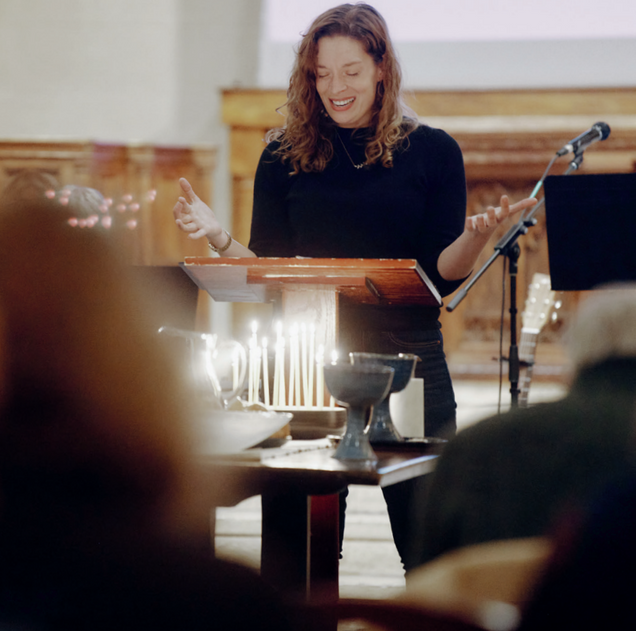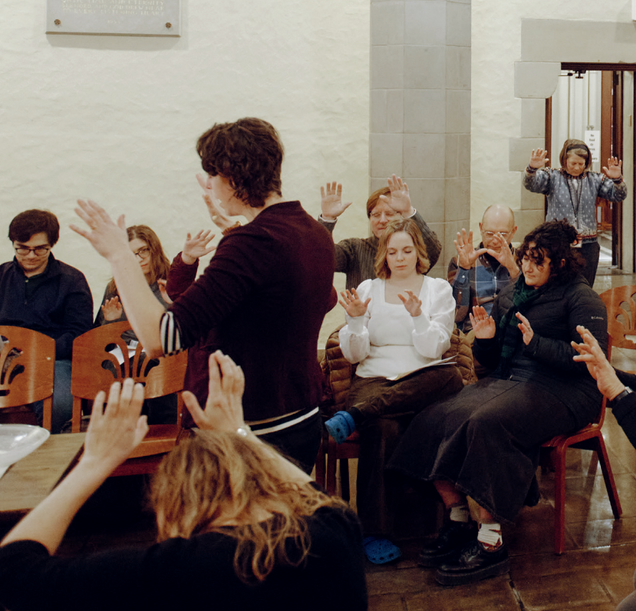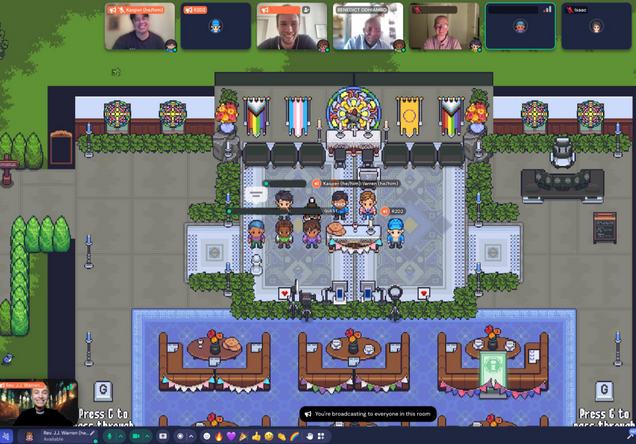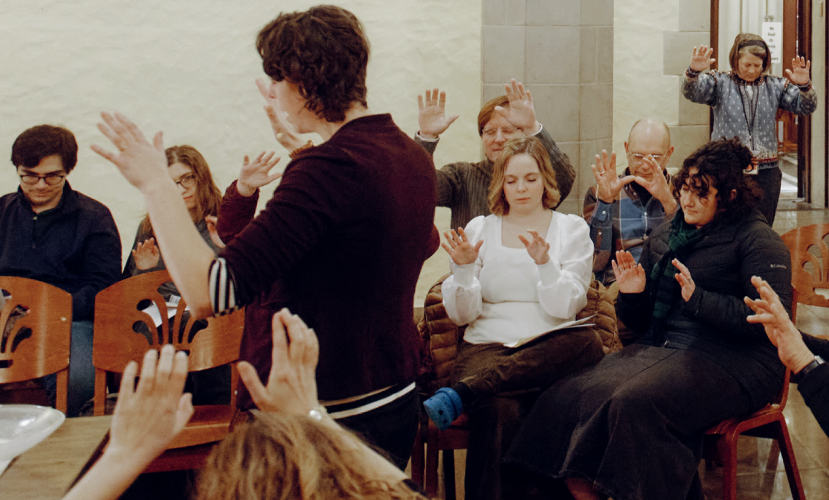Church for Everyone Else
This article was written by Steve Holt and originally published in the 2025 issue of focus magazine, the annual publication of the BU School of Theology. This article can be found on page 20.
Amid dropping church attendance and rising religious trauma, two services—one in person and one virtual—welcome those who’ve been hurt by religion. They’re also redefining what a worshipping community looks like.

Boston’s Old South Church traces its roots to Puritans in 1669, more than a century before the birth of the United States. For 150 years, the congregation—which had split from Boston’s Puritans over a dispute about baptism—gathered in the Old South Meeting House, best known as the site where Samuel Adams riled up would-be revolutionaries against British occupation. The church moved to its current location at Dartmouth and Boylston Streets in 1875, and today its gothic stone campanile soars above Copley Square. To whatever degree Boston has a religious “establishment,” 356-year-old Old South Church is it. But behind those old stones exists a Christian community extending a hand to those who’ve perhaps been wounded by established religion. For decades, the United Church of Christ congregation has had progressive theology and an open posture to all comers—LGBTQIA+, doubting, unhoused, or undocumented. A new Thursday evening service, however, packages those fundamentals in a slightly more contemporary way. The candlelit service is in Old South’s stunning Gordon Chapel, which is largely stripped of trappings like organs and clerical vestments and is centered on community, simplicity, and the table—both a communion table during the service and a shared meal afterward. A small band, led by Audrey Woodhams (’26), Thursday Night Church’s creative director, plays music that is acoustic and radio friendly. (Recent services have featured songs by Coldplay and Teddy Swims.) A reflection from one of the ministers (not a sermon) is uplifting, practical, and theological. Prayer requests are spoken aloud into a mic that is passed between worshippers. Queer attendees are always specifically welcomed and affirmed from the front of the chapel. A website describing Thursday Night Church, which the congregation launched in the spring of 2024, says the service is for “those hurt by closed minds and closed doors.”
 Plans for the revamped service began in late 2023, spearheaded by ministers Ashley Popperson (’14, SSW’14) and Rachel Barton (’23). “We spent a lot of time in prayer and conversation to try and discern the needs of the city,” Barton says of those early planning meetings. “The things we came up with were around longing to create spaces for vulnerability in community. We talked a lot about the epidemic of loneliness, particularly for younger folks. I think the pandemic tore up a bunch of ways that people knew how to connect with and relate to one another, and we really wanted to cultivate the opposite of that and make space where people could feel safe to be themselves together.” With church attendance plummeting nationwide and some queer or doubting Christians in search of a community where they are fully embraced, communities like Old South are breaking free of traditional and theological confines to extend radical welcome to seekers and saints alike. It’s a welcome embodied by the first few lines of “Seat at the Table,” the Common Hymnal tune Woodhams leads at the beginning of each Thursday service:
Plans for the revamped service began in late 2023, spearheaded by ministers Ashley Popperson (’14, SSW’14) and Rachel Barton (’23). “We spent a lot of time in prayer and conversation to try and discern the needs of the city,” Barton says of those early planning meetings. “The things we came up with were around longing to create spaces for vulnerability in community. We talked a lot about the epidemic of loneliness, particularly for younger folks. I think the pandemic tore up a bunch of ways that people knew how to connect with and relate to one another, and we really wanted to cultivate the opposite of that and make space where people could feel safe to be themselves together.” With church attendance plummeting nationwide and some queer or doubting Christians in search of a community where they are fully embraced, communities like Old South are breaking free of traditional and theological confines to extend radical welcome to seekers and saints alike. It’s a welcome embodied by the first few lines of “Seat at the Table,” the Common Hymnal tune Woodhams leads at the beginning of each Thursday service:
Don’t it feel good to know you’ve always got a place, yeah
A seat at the table that no one can take
I know that this road can be long
But, loved one, we welcome you home.

Virtual formation
The sanctuary at Church of the Young Prophets looks like others I’ve sat in: a large chancel, bordered by green plants, in the center of which is a table with communion bread and wine. A place for prayer is off to the side, and pride flags flank a circular stained-glass window at the center front of the room. Instead of pews or rows of chairs, couches are arranged in six semicircles around coffee tables, which hold more communion elements. On a Saturday in October, Rev. J.J. Warren approaches the lectern and greets those who have gathered for church. “We welcome you in the fullness of all of who you are,” says Warren (’22). “All of who you are is celebrated and welcomed and affirmed in this community.” He continues with several instructions for how to engage during the service. “We invite you, if you are in Gather.Town, to use the emoji bar at the bottom of your screen to let us know how you are approaching this time of worship. What are you feeling as you come into this space? In the chat, let us know where in the world you are, and who you are with as you worship with us today.” Emojis pop into the bottom left of my screen indicating feelings of anxiety, happiness, silliness. Members report in the chat that they are logging on from Oklahoma, Illinois, and elsewhere. Warren signed in from Vienna, Austria, where he lives with his husband and is pursuing a PhD. That’s right: Church of the Young Prophets is not built with bricks and mortar, but pixels and bytes. Members assemble each Saturday from seven countries using Gather.Town, a virtual meeting space that allows groups to customize it to their own needs and greet each other using avatars they control with their keyboard arrows. A Zoom-like video chat window shows each person’s face, unless they choose to remain off camera. Today, we’re in the sanctuary, but during the week church members and volunteers meet privately with Warren in his virtual office, sit around a shared table, walk the prayer labyrinth, or sing karaoke on the church’s rooftop lounge. A congregational channel on the gaming app Discord keeps the conversation and prayers going throughout the week—especially for Australian members who are asleep when the church is holding its Saturday church service.

“We’re still here”
Church of the Young Prophets was born following a speech Warren delivered advocating for LGBTQIA+ inclusion at the United Methodist Church’s 2019 General Conference, where the denomination reasserted its restrictions on queer members and clergy. LGBTQIA+ Methodists from around the world began to reach out to Warren, who was still working on an MDiv at STH, to express their concerns and hopes. To feel less alone. “I really felt this calling to create a space for us as our denomination was furthering harm against LGBTQ people, to create a space where young queer people could gather and say, ‘We’re still here,’” Warren tells me in an interview. They called themselves the Young Prophets Collective and initially gathered monthly on Zoom as something of a support group, facilitated by Warren and cocreator Alyssa Kuebler (’22). Over time, the group turned into a yearlong, global cohort of queer activists and ministry leaders working to “empower the people who were being disempowered by the church.” “We would work together for a year, and they would identify an injustice in their community, and then we’d work together to say, ‘How might you meet that need?’” Warren says. It was an opportunity to take theories Warren and Kuebler were learning at STH, like asset-based community development and liberation theologies, “distilling them into an accessible way for mostly lay leadership,” Warren says. UMC bishops have since voted to reverse course and formally embraced the queer community; the Young Prophets Collective is supported financially by the UMC’s New England Conference. But the virtual congregation remains vital to its members—a few of whom are in countries where living openly as queer persons is dangerous or illegal. This is why Warren makes a point of limiting who can attend to those who affirm LGBTQIA+ people and beginning each service with a statement celebrating the queerness in the room. “At a lot of churches, especially for queer people, you experience shame when you walk in,” Warren says. “Even the act of walking into a church can be triggering, so we are very explicit in the fact that we start every service with, ‘All of who you are is celebrated.’”
“I really felt this calling to create a space for us as our denomination was furthering harm against LGBTQ people, to create a space where young queer people could gather and say, ‘We’re still here.’” —J.J. Warren
Designing a space of welcome
In thinking about what the respective services would look and feel like, leaders of both Thursday Night Church and Church of the Young Prophets say they started with a vision of the people they wanted to serve. Old South’s Thursday Night Church was born out of Jazz Worship, a vibrant, music-forward expression that drew a different crowd than those who showed up for one of two Sunday morning services. When longtime musician Willie Sordillo announced in 2023 that he would be moving on from leading the Thursday service, Old South leaders assembled a “dreaming team,” which began to imagine a format change. Barton joined the ministry staff just as Popperson began holding visioning meetings for the future of Thursday worship. “We spent a lot of time in discernment and got to a strong sense that there was a community of people who likely had grown up in the church—either the Evangelical or the Catholic Church—and that those folks had not been able to find a place that they could call home, be themselves, and be welcome, but also deeply resonate with the music and the shape of the service,” Barton says. To shape that service, Old South tapped Woodhams—a Nashville-trained songwriter and worship leader who is pursuing an MDiv at STH. About a year into the revamped service, Barton says, around 60 percent of those attending are new faces and “largely exactly the people we were hoping to make a service for: younger folks, queer folks, young professionals, students coming into the city.” Like the leaders of Old South Church, Warren sought input from the community instead of building the church on his own preconceived notions of what it should be. He describes the Church of the Young Prophets as cocreated. One virtual service led to a four-week test run, after which Warren elicited feedback, which has led to a weekly service (and numerous other gatherings throughout the week) for two years. Services include prayers written by church members, both traditional hymns and contemporary worship songs, scripture readings, Warren’s mini-sermon, and conversation around the couches. “We’re constantly trying to reclaim different parts of the Christian tradition a little bit,” Warren says. He firmly believes their space is every bit as much a church—in all its pixelated glory—as the one with a steeple in the center of town. “Jesus says, ‘Where two or three are gathered in my name, I am among them,’” Warren says. “If we say, ‘Yeah, this meant something 2,000 years ago,’ how could we possibly say Jesus is not present here? Who are we to put a box on God and say that God could not be present through the media that we’re encountering here?”
